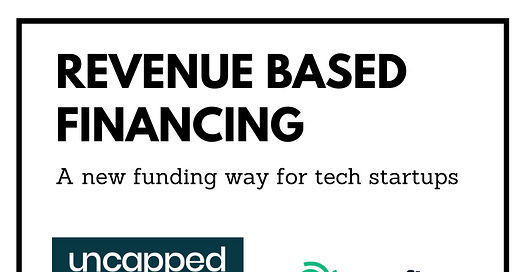Revenue-based financing (RBF) allows startups and small businesses to get funding without putting up any equity and without being bound by strict loan restrictions.
RBF is still worth a thought for tech startups, and I'm not the only one who thinks so, hence many major RBF investment deals in 2021.
Revenue-based financing FinTechs are expected to increase globally in 2022.
If you are interested in startups and funding, you might have come across some articles about revenue-based financing (also known as revenue-based investing). So, why is it that more and more tech startups are turning to this way of financing as another alternative to VC financing?
First, what’s revenue-based financing (RBF)?
Revenue-based finance (RBF) enables startups and SMEs to obtain finance without giving up equity and escaping the burden of rigid lending terms. The finance is paid back as a proportion of the revenue earned, allowing the repayments to adapt to the way the company grows.
Another big plus for RBF is that investors generally do not take equity. As a result, there is no ownership dilution to founders and early equity investors. Also, RBF investors do not take board seats or put strict financial limitations on a company. Founders can retain control and drive the company toward their goal.
RBF can be faster than, let’s say, VC funding. It might take months or years to get a deal when pitching to venture investors. Lenders can give money in as little as four weeks since RBF investors do not expect firms to achieve hyper-growth or big-equity exits.
But what sets RBF apart from the usual line of investments are the repayments. Monthly payments are calculated as a proportion of your monthly revenue. This means that if you have a difficult month, your monthly payment will reflect it, and you will not be saddled with a hefty payment you cannot afford.
One downside to RBF is that only startups that have already generated revenue will qualify. RBF deals will not provide capital that is worth more than 3 to 4 months of a company’s monthly recurring revenue (MRR).
We’ve seen a lot of B2B SaaS startups and even e-commerce and marketplaces getting RBF. These types of companies are somewhat easy to get into RBF because there is a more clear correlation between financing and generated sales.
What are the FinTechs offering RBF?
In Europe, London-based Outfund and Uncapped are focused on online businesses and Dublin-based Wayflyer primarily focuses on eCommerce, already providing tens of millions of investments in the last few months.
From Berlin, Uplift1 offers a straightforward investment process: founders complete an online form and are invited to a preliminary screening call to discuss metrics and needs. If everything appears to be mutually beneficial, both parties sign an NDA, with the whole process only taking roughly a week to go through.
In North America, the Canadian Clearco (previously Clearbanc), which raised USD $220 million in venture capital and already invested more than USD $2 billion in 4500 companies. It also created a new US $100 million programs, ClearAngel Fund, to give money to startups that do not have access to angel finance networks.
The US-based Pipe and Capchase raised USD $250 million and USD $125 million respectively, setting the trend of RBF FinTechs getting millions of funding.
And RBF is not limited only to developed countries. Jenfi, established in Singapore, offers revenue-based financing of up to USD $500,000 with flexible payback arrangements, referring to it as "growth capital as a product" co-founder and CEO Jeffrey Liu mentioned in this TechCrunch article.
All in all, RBF is still worth a shot for tech startups, and I’m not alone in thinking that, hence all the big investment deals in 2021.
By 2022, revenue-based financing FinTechs are growing globally. For many, revenue-based financing is already another tool in the entrepreneur’s toolbox and it can help growth-stage companies hit their stride and reach the next level; all without risking personal assets or selling off part of the business.
What’s your opinion on RBF? Do you think we will see continued growth and more players in this market in 2022?
I also have several newsletters that might be worth checking: https://marcelvanoost.com/newsletter
Follow me on Twitter, Linkedin, and Telegram.
Discover other newsletters by MVO.






In india you have Klub (https://klubworks.com/) that does RBF. This is a great model for startups esp in D2C